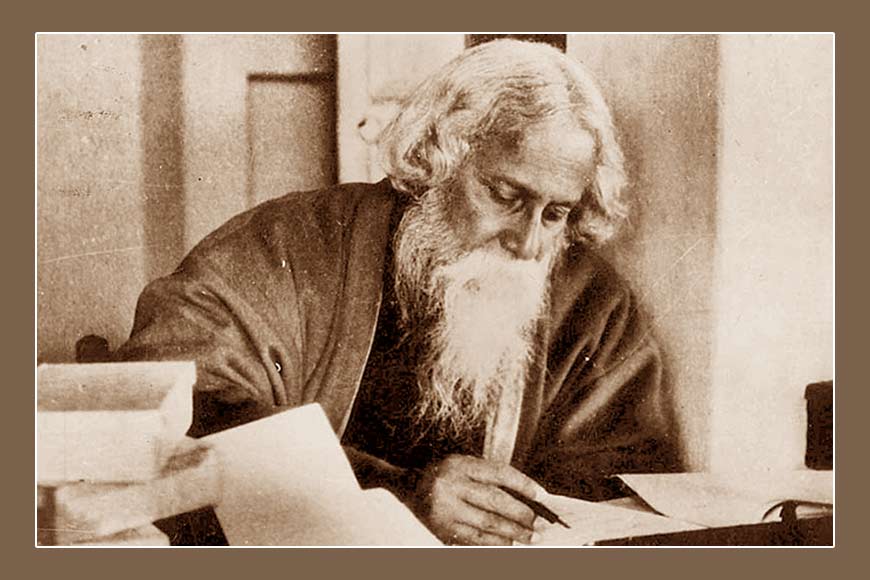General public of Russia was warm towards Tagore despite Stalin’s sanctions on him

Letters from Russia by Rabindranath Tagore written in 1930 is not just a treasure trove of memories but a detailed explanation of a country’s psyche, a nation that blended socialism with violence and radical ideologies that Tagore felt might not bear fruit in future. The present war between Russia and Ukraine might have its seeds in that psyche that Rabindranath Tagore so well explained in his letters from Russia. GB carries this series reflecting on why these letters are valuable in the present war-ripped Europe. In this 3rd part, we discuss how Tagore was greeted by the music, theatre and literature-loving people of Russia
Even though Stalin had a major problem with Rabindranath Tagore’s honest observation of a coercive regime and his criticism, the public of Russia was very welcoming towards Tagore and his creations. The people of Russia had always been a very warm crowd, trying to embrace all and mix cultures. In the memoirs of Nicholas Roerich, one gets to read the lines on Tagore’s Gitanjali that won the Nobel Prize. “Gitanjali came like a revelation. The poems were read at gatherings and at private homes. Only true talent could create such a precious mutual understanding. Now everyone at once became imbued with love for Tagore. It was evident how most contradictory people, the most irreconcilable psychologists were united by the call of the poet.”
In the 1950s and 60s, long after the poet’s death, Boris Pasternak translated his works as did Anna Akhmatova. Even the Soviet government decided to publish the collected works of Tagore in 1926. His poems and reviews of his work began appearing in many Soviet magazines. In his article “The Indian Tolstoy”, Anatoly Lunacharsky, the Soviet people’s commissar (minister) of education, stated, “Tagore’s works are so full of colour, subtle spiritual experiences and truly noble ideas that they now constitute a treasure of human culture.”
While addressing the public in Russia, Tagore was deeply touched by this warm hospitality of Russians. He said: “You can’t imagine how long I have wanted to come to your country, which I love for its literature. And now that your people have become completely new and different compared to how they used to be, as my friends tell me, I am even more eager to come. I want to get to know your music, your theatre, your dances and become acquainted with your literature.”
Academic Sergei Oldenburg wrote, “When we meet the great Indian poet here, we will be meeting a person who, in Bengali words, has said what we all understand and feel.” Tagore was not a politician, rather the sole purpose of his life was enlightenment through knowledge. While visiting the Tretyakov Art Gallery, Tagore was overwhelmed. “In Moscow, there is a renowned collection of paintings called the Tretyakov Gallery. In just one year, from 1928 to 1929, it was visited by approximately three hundred thousand people. The building does not have enough room for everyone who wishes to visit, therefore people sign up in lines before the weekend.”
Read the earlier episodes of 'Letters from Russia':
Tagore’s ‘Letters from Russia’ written almost a century ago reflects a confused nation
Did Russia behave like a fascist? Tagore’s letters reveal the nation’s history of violence
The overcrowded theatres left an indelible impression on Tagore. “In earlier times, the theatres were only open to the royal family and the nobility. Today they are packed with people who till recently went around in filthy rags, barefoot, dying of starvation, living in constant fear before God, seeking any favour they could with priests, worried about the salvation of their souls and have been infinitely humbled, lying in the dirt at the feet of their masters.”
The Russians not just loved the great poet’s writings. They were equally appreciative of his paintings and in September 1930, Tagore’s works were showcased at the State Museum of New Western Art featuring more than 200 watercolours. “An exhibit of my paintings was organised in Moscow. People came in endless crowds. Five thousand people visited the exhibit in just a few days.” The exhibit of paintings was a huge success among Muscovites. Soviet artists presented Tagore with the gift of a marble mask of Tolstoy, which one can still find in Santiniketan.
Tagore’s visit ended on 24 September 1930 with a festive concert at the Pillar Hall of the House of Unions, where the most important state events were traditionally held. Russia’s best singers and dance ensembles took part in the concert. The author’s poems were read from the stage of the Pillar Hall in Bengali. “After my trip to Russia, today I am leaving for America,” he wrote at the end of one of his letters. “But the memory of Russia continues to dominate all my being. The thing is the other countries I have visited did not stir up my imagination in the same way. Their business-like energy is scattered around various types of activities, be it politics, hospitals, schools or museums. And here… everyone is united by common aspirations. Such a profound unity of souls is impossible in countries where property and energy are separated into personal interests.”
(Concluded)










